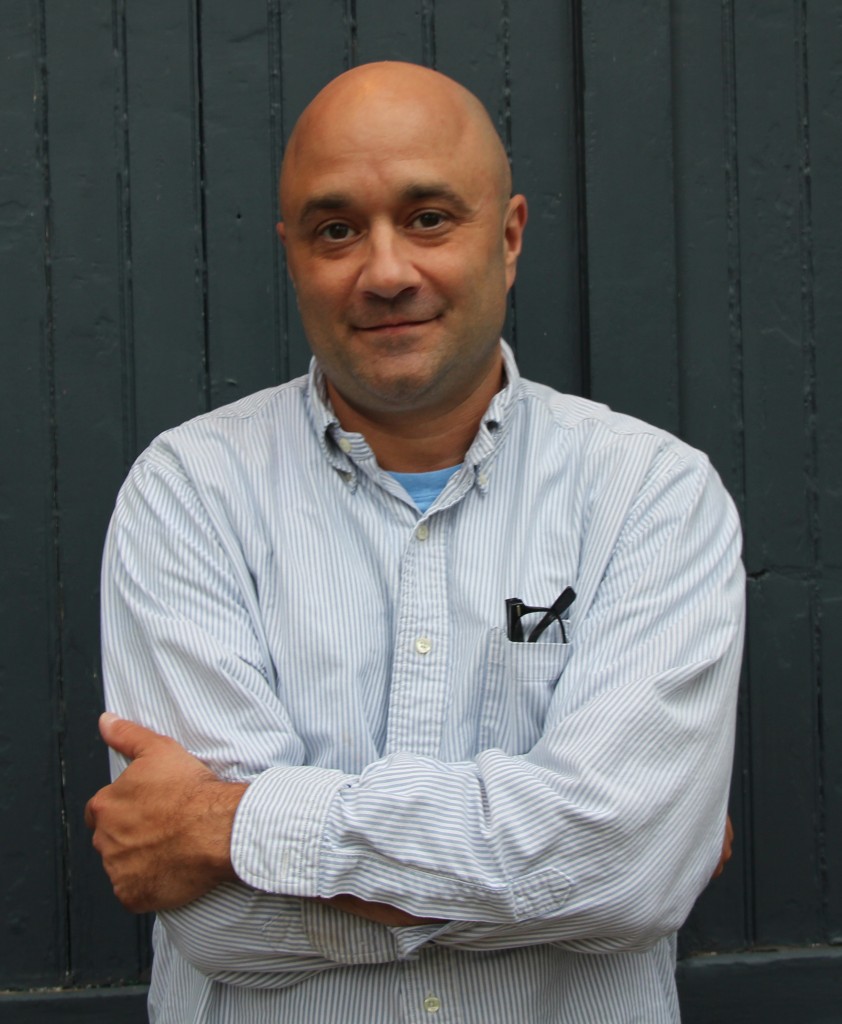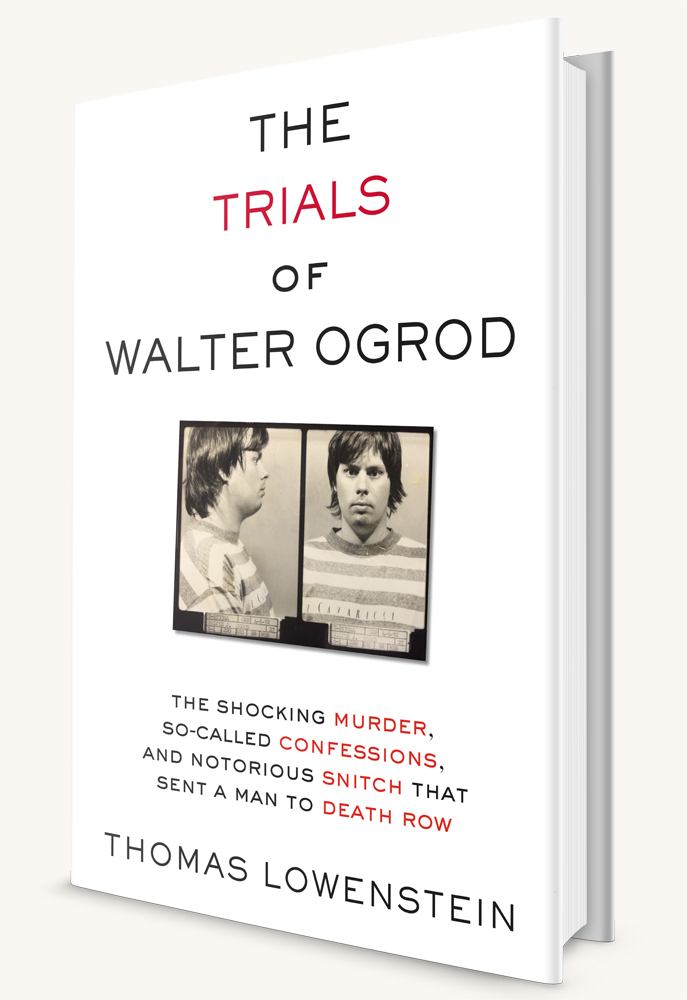 If you’re fascinated by wrongful conviction stories like those in Serial and Making a Murderer, you’ll want to pick up a copy of our forthcoming book The Trials of Walter Ogrod: The Shocking Murder, So-Called Confessions, and Notorious Snitch That Sent a Man to Death Row. by Thomas Lowenstein. It presents the case of a man with autism spectrum disorder who currently sits on death row for the murder of a four-year-old girl—a horrific 1988 event that rocked the city of Philadelphia to its core.
If you’re fascinated by wrongful conviction stories like those in Serial and Making a Murderer, you’ll want to pick up a copy of our forthcoming book The Trials of Walter Ogrod: The Shocking Murder, So-Called Confessions, and Notorious Snitch That Sent a Man to Death Row. by Thomas Lowenstein. It presents the case of a man with autism spectrum disorder who currently sits on death row for the murder of a four-year-old girl—a horrific 1988 event that rocked the city of Philadelphia to its core.
What makes this retelling so compelling is that the author, Thomas Lowenstein—whose late father Al Lowenstein, US representative for New York’s 5th District, was murdered when Tom was young—set out to write a book about how the death penalty works from all angles (victim, defendant, lawyers, etc.). Given his family history, Lowenstein fully expected to believe that his subject, chosen at random, was truly guilty of the crime. But as he begins following Walter Ogrod’s case, he starts to believe more and more in Walter’s innocence—and becomes convinced of a larger underlying pattern of prosecutorial misconduct in the Philadelphia court system.
The book goes on sale April 1. Below, Thomas Lowenstein gives readers a bit of background on the case.
Walter Ogrod is currently serving a death row sentence for the 1988 murder of a 4-year-old girl in Philadelphia. Can you briefly explain the facts of that summer day in 1988, what we know for certain?
On July 12, 1988, four-year-old Barbara Jean Horn disappeared from her front yard on Rutland Street in Northeast Philadelphia sometime between 3 and 4 PM. At 5:12 PM, a man carrying a TV box was seen walking through the neighborhood, about two blocks from her house. The man put the box down on the curb at about 5:25 PM, and it was opened by neighbors two or three minutes later. Barbara Jean’s body was in the box. Despite good descriptions of the man from five witnesses, one of whom had talked to him for 11 minutes, he was never found, and the crime went unsolved for four years.
Then, in 1992, detectives brought in Walter Ogrod, who’d lived across the street from the little girl, for questioning. After more than 14 hours in an interrogation room, Ogrod signed a confession to the murder of Barbara Jean Horn. He retracted the confession the next morning, and he has maintained his innocence ever since. At his first trial, in 1993, the jury believed him and voted to acquit him. But one juror changed his mind at the last second, and Walter went back to prison to await retrial.
Can you also describe your impetus for wanting to write a book on a death row case such as this, and how you connected with Walter?
I set out to write about how the death penalty worked when it worked well—my idea was to write a book about how the death penalty process affects those involved in it, from the victim’s family to the killer’s family, the detectives, the lawyers, etc. My own father was murdered when I was a kid, but I was against the death penalty, so I was interested to see how the death penalty affected families of victims when it “worked.” I also thought I might learn something about murder or murderers as a group. I chose two inmates at random from an inmate penpal website and wrote to them, vowing I’d write about whoever answered my letter, no matter what they did. When I heard from Ogrod I was almost too disgusted by the crime he’d been convicted of to go on. He said he didn’t do it and I didn’t believe him. But I started researching the case anyway. That was in 2001.
Instead of finding a case in which the death penalty “works,” you came to some drastically different conclusions. What were they? How has your attitude on the death penalty changed?
I was already against the death penalty, and this case has only strengthened that. It’s a classic example of what happens when a highly political DA runs into a high-profile case that needs to be solved. I was aware of mistakes in death penalty cases before I worked on this book, but not of the true scope and depth of the “win at all costs” mentality that pervades so many district attorneys’ offices around the country. In the case of my father’s murder, I’d always wanted the DA to be a lot tougher, so this isn’t a conclusion that I come to lightly. But too many DAs just want to win, no matter what.
In the book you maintain that Walter has autism spectrum disorder, though he’s never been given an official diagnosis. Explain how this discovery helped clue you in further to the possibility of his innocence.
The ASD issue was defining for me because as I started to work on the case I heard over and over again from Ogrod’s friends and family that he was (in the jargon of his childhood) “retarded.” I’d also read that the foreman of his first jury had told reporters after the mistrial that there was “no way that man [Ogrod] could have given that confession” and I wondered how he could be so sure. After spending six hours with Ogrod on the first day of our interview I thought, he was definitely not “retarded,” but there was something about him that was, as so many people had told me, “off.” For me, realizing that he was beyond just socially awkward, that he behaved a lot like some students I knew who had Asperger’s syndrome, helped me understand that he actually could not have given the confession the way the detectives said he did, and that it’s possible that his affect is what made the detectives think he was guilty to begin with.
Tell us about “the Monsignor.”
John “the Monsignor” Hall was the main snitch in the Ogrod case. He was so famous among Philadelphia law enforcement that they gave him his nickname—“The Monsignor”—because he’d “heard more confessions than a priest.” John would get busted, usually for something to do with forgery or drugs, and be sent to jail, where he would remarkably find himself in a cell or cell block with an inmate in an old, high-profile murder case, one the DA didn’t have enough evidence to win. Sure enough, John would report that the inmate had confessed to him and, in exchange for testifying against the inmate, would get himself a deal. He did this so many times it became a joke (there’s a great transcript of a judge telling him he was the best crime fighter in Philadelphia because he got locked up so much and always snitched out other inmates). What was amazing to me was the letters John had from DAs saying that in such and such a case they’d had no evidence until John came along, but based on what John said they were able to get a conviction. And that DAs would use John in one case while dismissing him as a liar in other cases, all at the same time. In other words, they knew he lied but used him anyway—even in cases, like Ogrod’s case, where the “information” John gave did not at all fit the facts of the case.
 Do you still keep in touch with Walter? How is he doing?
Do you still keep in touch with Walter? How is he doing?
I do keep in touch with Walter Ogrod. He is hanging in there. His latest hearing was on March 10 of this year. Unfortunately, the judge who is going to decide whether Ogrod gets a new trial is Shelley Robins-New—who was an assistant DA in the same office that prosecuted Ogrod back in 1993 and again in 1996. Judge Robins-New therefore worked with and under Judi Rubino, the legendary prosecutor who won Ogrod’s retrial. She has said she has no memory of working on the Ogrod case but has not addressed whether or not she worked on any of the other John Hall cases circulating in that office at that time. The Philadelphia DA’s office has agreed to have a hearing on three of the many, many issues in the Ogrod appeal. This is not nearly enough, and in any event the hearing most likely couldn’t take place before the fall of this year. Even now, when the DA has admitted there could be problem enough on three issues that it’s worth having a hearing on those issues, there is no urgency to the matter.
Thomas Lowenstein, son of the late U.S. Representative for New York, 5th District, Allard Lowenstein, is the founder of the New Orleans Journalism Project, which works with journalism students on stories related to criminal justice issues. He was formerly the policy director and an investigator at The Innocence Project New Orleans, an editor at Doubletake magazine, and a teaching fellow at Harvard. He has contributed to the American Prospect magazine and the Philadelphia City Paper. He lives in New Orleans, Louisiana.
The Trials of Walter Ogrod: The Shocking Murder, So-Called Confessions, and Notorious Snitch that Sent a Man to Death Row by Thomas Lowenstein, officially publishes April 1, 2017. It is available wherever books and e-books are sold.
“A death row inmate, a murder victim’s son, and a 16-year quest for justice” —Philadelphia Daily News (article)
“True-crime stories are always popular, and fans of the Making a Murderer series will be especially outraged by this unjust case.” —Booklist
1 Comment
I just watched the story of Walter Ogrod and I’m not able to sleep. I can NOT wrap my brain around how anyone could, knowing that there is a man who has already lost so much and is sitting on death row, when there is evidence that could exonerate him. I have been moved to tears and even frustration due to not only his life…but of little Barbara Jean. Her killer could be identified through the evidence which the Common Wealth holds! It scares me and shakes me to my core seeing such injustice and complete failure in our system! What can I do to help? My name is Janay I live 20minutes from Waynesburg Pa.